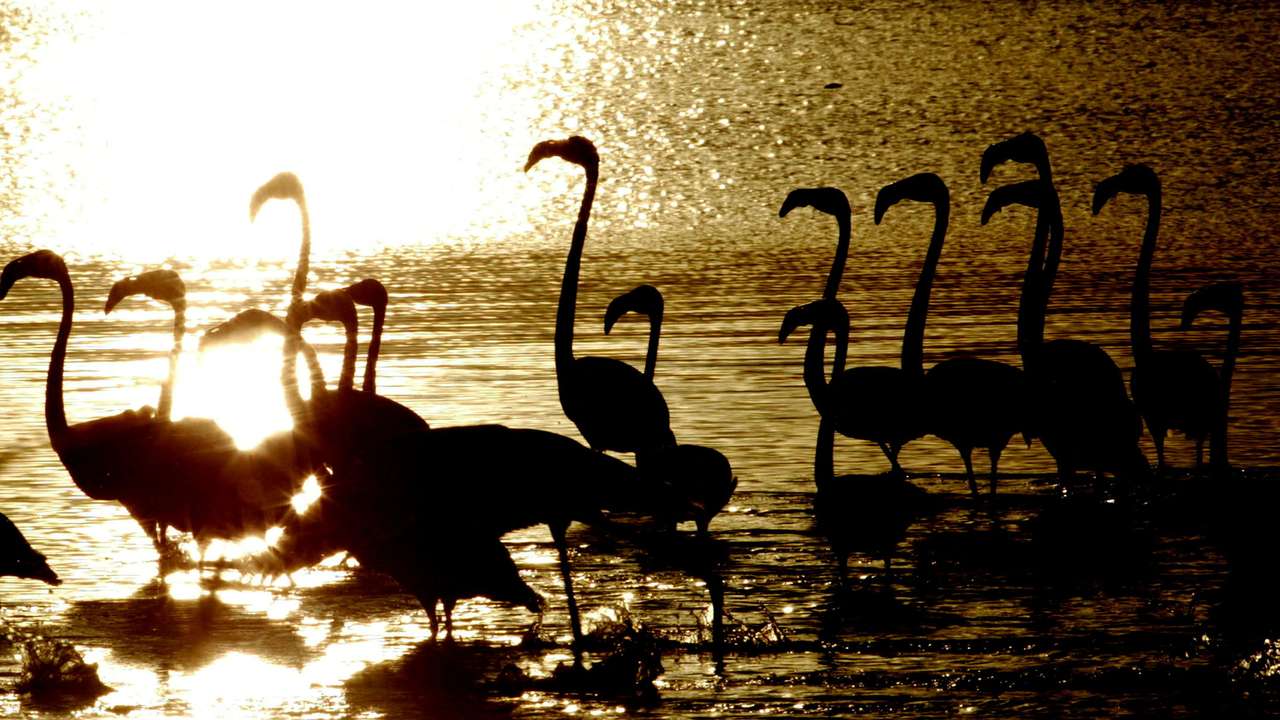Lesser flamingos lose one of their only four African breeding sites to sewage

By Tim Cocks
Until the last half-decade, the majestic lesser flamingo had four African breeding sites: two salt pans in Botswana and Namibia, a soda lake in Tanzania, and an artificial dam outside South Africa's historic diamond-mining town of Kimberley.
Now it only has three.
Years of raw sewage spilling into Kamfers Dam, the only South African water body where lesser flamingos congregated in large enough numbers to breed, have rendered the water so toxic that the distinctive pink birds have abandoned it, according to conservationists and a court judgment against the local council seen by Reuters.
Lesser flamingos are currently considered near-threatened, rather than endangered, by the International Union for Conservation of Nature: there are 2-3 million left, four-fifths of them spread across Africa, the rest in a smaller area of South Asia.
But they are in steep decline, and the poisoning of one of their last few breeding sites has worsened their plight dramatically.
Tania Anderson, a conservation biologist specialising in flamingos, told Reuters the IUCN was about to increase its threat-level to "vulnerable", meaning "at high risk of extinction in the wild", owing largely to their shrinking habitats of salty estuaries or soda lakes shallow enough for them to wade through.
"It's really very upsetting," Anderson said of the sewage spills in Kamfers Dam. "Flamingos play a pivotal role in maintaining the water ecosystems of our wetlands."
A 2021 study in Biological Conservation found sewage threatens aquatic ecosystems across a vast area of the planet. Although 200 nations came together at the U.N. COP16 biodiversity summit in Colombia last year to tackle threats to wildlife, no agreement was reached.
'THEY JUST DISAPPEARED'
Footage taken by the Wildlife and Environment Society of South Africa in May 2020 shows Kamfers Dam turned flamboyant pink with flamingos. When Reuters visited this month, there were none.
A closer look at the water revealed a green sludge that bubbled and stank of human waste.
"It was a sea of pink," Brenda Booth recalled, as she gazed over the bird-free lake located on the farm she owns, dotted with acacia trees and antelope.
"They all just disappeared," said Booth, who last month secured the court order compelling the African National Congress-run municipality in charge of Kimberley, a city of 300,000, to fix the problem.
Over the years, the treatment plant "became progressively dysfunctional to the point where ... approximately 36 megalitres a day of untreated sewage was being discharged into the dam," said Adrian Horwitz, the lawyer bringing the case in the High Court of South Africa, Northern Cape division.
Municipality manager Thapelo Matlala told Reuters thieves had vandalised the plant and stolen equipment, grinding it to a halt.
"We are working on a new strategy for ... repairing the damage," he said outside his office, adding that this needed 106 million rand ($5.92 million), money the council didn't have.
Failure to deliver services was one of the main reasons the ANC lost its 30-year-strong majority in last year's elections.
Lesser flamingos mostly eat spirulina, a blue-green algae - filtering it through their beaks. This limits them to alkaline water bodies, largely in East Africa's Rift Valley.
They're fussy about where they breed, with just three sites in India alongside the remaining three in Africa.
Flamingos began breeding at Kamfers Dam in 2006, said Ester van der Westhuizen-Coetzer, wetlands specialist for local diamond miner Ekapa Group, as she waded through grassland at the edge of another lake where she had spotted a flock.
In 2020, there were 71,000 on the dam, with up to 5,000 new chicks each season.
"They've missed three or four breeding seasons," she said, and many also died of botulism, a disease that flourishes in waste.
Sewage has become a problem across South Africa, where few treatment plants are in working order, and if nothing is done, "the whole system will degrade and blow up," she said.
"That will have a huge impact, and not only on flamingos."
This article was produced by Reuters news agency. It has not been edited by Global South World.